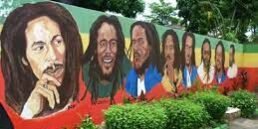The Bob Marley Museum, located in Kingston, Jamaica, is a cultural and historical landmark dedicated to one of the most iconic figures in music history. Bob Marley, known as the King of Reggae, transcended music to become a global symbol of peace, love, and unity. The museum offers a unique glimpse into the life, music, and legacy of Marley, preserving the rich history of reggae and Jamaican culture. This article explores the significance of the Bob Marley Museum, its history, and the treasures it holds within its walls.
The Historical Significance of the Bob Marley Museum
The Bob Marley Museum is housed in what was once Bob Marley’s home and recording studio. This colonial-era building, located at 56 Hope Road, was acquired by Marley in 1975. It served as his residence until his death in 1981 and became a museum in 1986, established by his wife, Rita Marley. The museum stands as a testament to Marley’s enduring influence on music and culture, attracting fans and tourists from around the world.
The significance of the museum lies not only in its preservation of Marley’s personal and professional life but also in its role as a cultural heritage site. It represents the global impact of reggae music and the Rastafarian movement, which Marley popularized. The museum provides an authentic experience, allowing visitors to connect with the spirit of Marley and the essence of Jamaican culture.
Inside the Museum: A Journey Through Bob Marley’s Life
The House and Grounds
The museum’s tour begins with the main house, a two-story building that has been carefully preserved and restored. The exterior features vibrant Rastafarian colors—red, green, and gold—which are symbolic of the movement’s principles of peace, love, and unity. The grounds also include a statue of Marley, a café, and a gift shop offering memorabilia and music.
The Main Exhibition
The heart of the museum lies in its main exhibition area, which provides a comprehensive look at Bob Marley’s life, from his early days in Nine Mile, Jamaica, to his rise as an international superstar. This section includes:
Personal Artifacts: Visitors can see Marley’s personal items, including his clothing, records, and photographs. These artifacts provide insight into his personal life and the man behind the music.
Music and Awards: The museum showcases Marley’s extensive music collection, including original recordings and instruments. Awards and accolades received throughout his career are also on display, highlighting his achievements and contributions to music.
The Recording Studio: One of the most iconic parts of the museum is Marley’s original recording studio, known as the Tuff Gong Studio. This studio was the birthplace of many of his greatest hits and offers a unique look at the creative space where Marley crafted his music.
The Meditation Room: This room was Marley’s personal sanctuary, where he would meditate and find inspiration. It contains religious and spiritual items, reflecting Marley’s deep connection to the Rastafarian faith.
The Legacy of Bob Marley
Bob Marley’s legacy extends far beyond his music. He was a cultural ambassador for Jamaica and a vocal advocate for peace, social justice, and unity. The museum captures this aspect of his life, showcasing his activism and the messages behind his lyrics.
Social and Political Activism
Marley’s music often addressed social and political issues, advocating for the rights of the oppressed and marginalized. Songs like “Get Up, Stand Up,” “War,” and “Redemption Song” are powerful anthems for justice and equality. The museum highlights Marley’s involvement in various causes, including his support for the anti-apartheid movement in South Africa and his role in the One Love Peace Concert, which aimed to promote peace in Jamaica during a period of political turmoil.
Global Influence and Cultural Impact
Marley’s influence is not confined to Jamaica; his music and message have resonated with people around the world. The museum emphasizes his global reach, showcasing letters and gifts from fans across the globe, as well as his collaborations with international artists. Marley’s image and music continue to inspire new generations, making the museum a place of pilgrimage for fans worldwide.
The Rastafarian Movement and Marley
The Bob Marley Museum also serves as an educational center for the Rastafarian movement, a spiritual and cultural movement that originated in Jamaica in the 1930s. Marley was a devoted Rastafarian, and his music is infused with the philosophy and teachings of the movement. The museum provides visitors with an understanding of Rastafarian beliefs, including the significance of Haile Selassie, the importance of natural living, and the symbolic use of marijuana.
Visiting the Museum: A Practical Guide
Location and Accessibility
The Bob Marley Museum is located at 56 Hope Road, Kingston, Jamaica. It is easily accessible from downtown Kingston and is a must-visit for anyone traveling to the city. The museum is open Monday to Saturday, with guided tours available throughout the day.
Tour Experience
The guided tours are a highlight of the museum visit. Knowledgeable guides take visitors through the house and exhibition areas, providing detailed insights into Marley’s life and legacy. The tours last approximately one hour and offer a rich, immersive experience. Visitors are encouraged to ask questions and engage with the exhibits.
Additional Attractions
In addition to the main exhibition, the museum offers several other attractions. The One Love Café serves traditional Jamaican food and beverages, providing a taste of the local culture. The gift shop is stocked with Bob Marley memorabilia, including clothing, music, and books, allowing visitors to take a piece of the experience home with them.
Conclusion
The Bob Marley Museum is more than just a museum; it is a cultural treasure that preserves the legacy of one of the most influential musicians of the 20th century. It offers a deep dive into Bob Marley’s life, his music, and his impact on the world. For fans of Marley and reggae music, a visit to the museum is a pilgrimage, providing a unique opportunity to connect with the man behind the legend. For others, it offers an insightful look into Jamaican culture and the power of music as a force for change. Whether you are a longtime fan or a curious traveler, the Bob Marley Museum is an essential stop in Kingston, offering a rich and enlightening experience.









